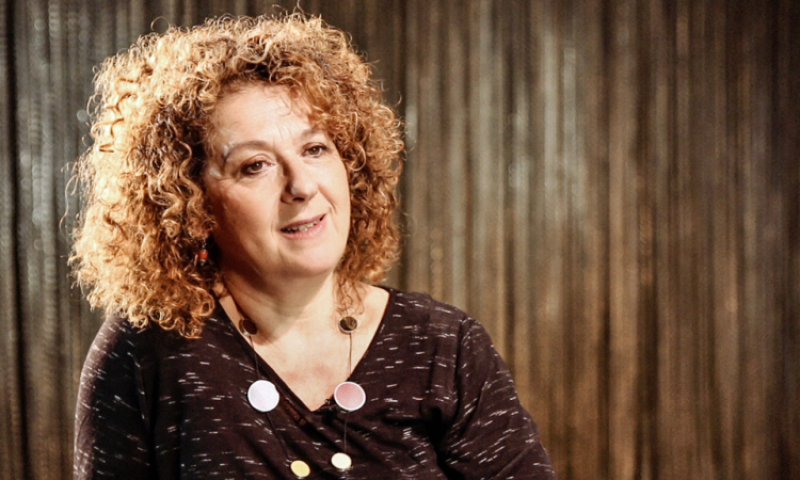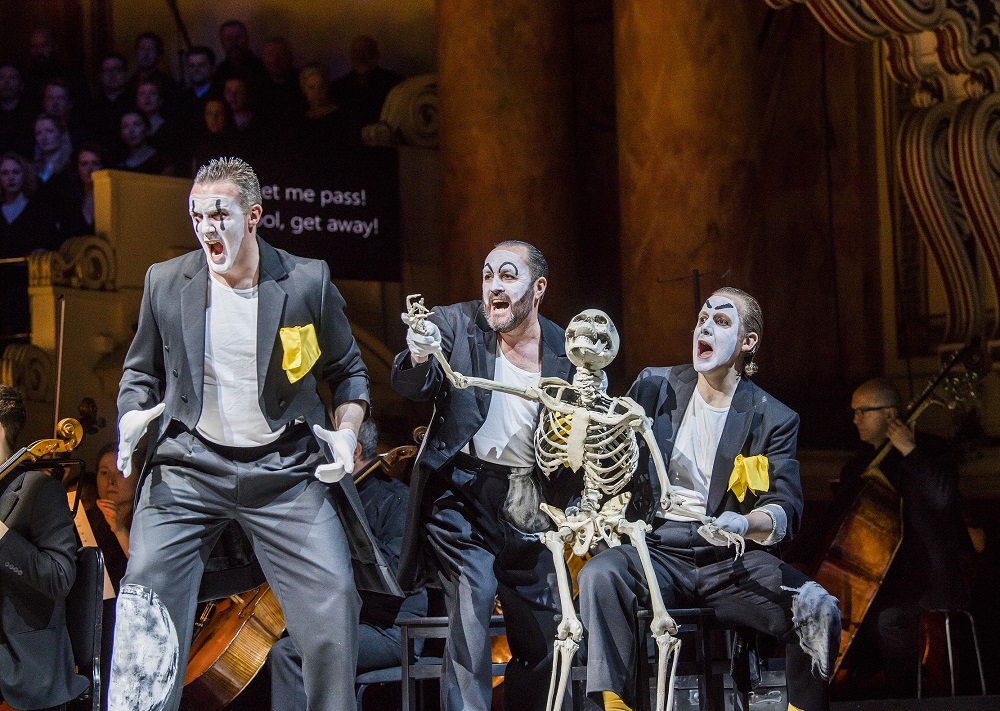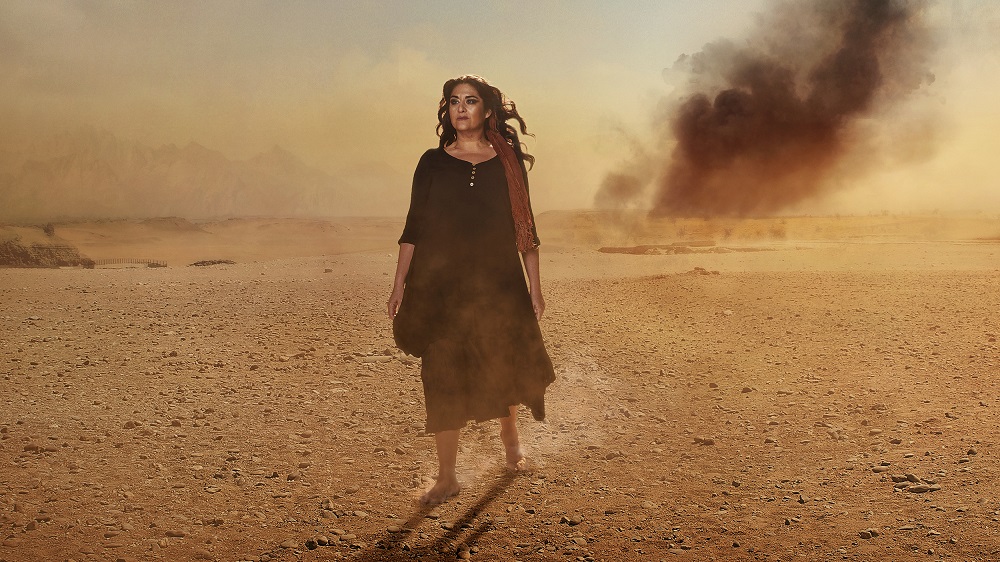'The orchestra becomes the landscape': Annabel Arden on Opera North's concert staging of Aida | reviews, news & interviews
'The orchestra becomes the landscape': Annabel Arden on Opera North's concert staging of Aida
'The orchestra becomes the landscape': Annabel Arden on Opera North's concert staging of Aida
The director on Verdi's late masterpiece in a war-torn contemporary setting

This will be the latest in Opera North’s acclaimed concert stagings of large-scale works, which have previously included Wagner’s Ring cycle, Puccini’s Turandot and Strauss’s Salome.
I find it exciting to treat iconic works like this because the performances offer a new way to experience classic opera. When you get rid of the proscenium arch, you feel very close to the singers; they are in the same space as the audience. Yet it is not a concert. The performers are inhabiting their roles fully. There might be quite physical staging, full costume, and certainly psychological and emotional depth. In Turandot, for example, we had a dancing skeleton (pictured below with the trio of "masks", by Tristram Kenton), a torture scene which involved some visceral action, and Turandot’s giant throne, which collapsed.  In these stagings, the orchestra becomes the landscape of the piece. Normally, most of the people in the audience are unable to see them as they are hidden in the pit, but so much of the drama is in their playing that it is truly thrilling to have them centre stage. Turandot, for example, has the most amazing percussion, and in Aida the famous trumpets are as exciting to watch as they are to hear. Added to the huge energy of the orchestra are dramatic lighting, video projections, and the intense presence and massed voices of the Chorus of Opera North.
In these stagings, the orchestra becomes the landscape of the piece. Normally, most of the people in the audience are unable to see them as they are hidden in the pit, but so much of the drama is in their playing that it is truly thrilling to have them centre stage. Turandot, for example, has the most amazing percussion, and in Aida the famous trumpets are as exciting to watch as they are to hear. Added to the huge energy of the orchestra are dramatic lighting, video projections, and the intense presence and massed voices of the Chorus of Opera North.
It's liberating to stretch the imagination by not having a set; I can concentrate on character and the essential elements of the drama. In a sense it is Shakespearean: he didn’t have "sets" at The Globe, and in the Prologue of Henry V he wrote, "Think when we talk of horses, that you see them." That is what these concert stagings are all about. They invite the audience to take an active role in the imaginative process.  For this production, I am interpreting Aida as happening in a contemporary world where war is everywhere (publicity image pictured above). Aida's emotional landscape is also a very interior one; she is very close to death and experiences exile and loss most intensely. We only have to turn on the TV – or look around us – to see many situations today which could be Aida’s. Jealousy, ambition, patriotism and family conflict are eternal human experiences, and the focus in our production will be on the characters’ relationships with each other.
For this production, I am interpreting Aida as happening in a contemporary world where war is everywhere (publicity image pictured above). Aida's emotional landscape is also a very interior one; she is very close to death and experiences exile and loss most intensely. We only have to turn on the TV – or look around us – to see many situations today which could be Aida’s. Jealousy, ambition, patriotism and family conflict are eternal human experiences, and the focus in our production will be on the characters’ relationships with each other.
Most people will know Aida’s big triumphal march, but I love the delicate music, of which there is a surprising amount. There’s also extremely atmospheric music which evokes heat and night, as well as Aida’s beautiful and sad arias. The final duet where you can hear the singers literally run out of air in the tomb is extraordinary. There’s such a range of sounds and dynamics in this opera, it will be interesting how they translate in the various venues where we’re performing it.
The future of Arts Journalism
You can stop theartsdesk.com closing!
We urgently need financing to survive. Our fundraising drive has thus far raised £49,000 but we need to reach £100,000 or we will be forced to close. Please contribute here: https://gofund.me/c3f6033d
And if you can forward this information to anyone who might assist, we’d be grateful.

Subscribe to theartsdesk.com
Thank you for continuing to read our work on theartsdesk.com. For unlimited access to every article in its entirety, including our archive of more than 15,000 pieces, we're asking for £5 per month or £40 per year. We feel it's a very good deal, and hope you do too.
To take a subscription now simply click here.
And if you're looking for that extra gift for a friend or family member, why not treat them to a theartsdesk.com gift subscription?
more Opera
 Tosca, Welsh National Opera review - a great company reduced to brilliance
The old warhorse made special by the basics
Tosca, Welsh National Opera review - a great company reduced to brilliance
The old warhorse made special by the basics
 BBC Proms: The Marriage of Figaro, Glyndebourne Festival review - merriment and menace
Strong Proms transfer for a robust and affecting show
BBC Proms: The Marriage of Figaro, Glyndebourne Festival review - merriment and menace
Strong Proms transfer for a robust and affecting show
 BBC Proms: Suor Angelica, LSO, Pappano review - earthly passion, heavenly grief
A Sister to remember blesses Puccini's convent tragedy
BBC Proms: Suor Angelica, LSO, Pappano review - earthly passion, heavenly grief
A Sister to remember blesses Puccini's convent tragedy
 Orpheus and Eurydice, Opera Queensland/SCO, Edinburgh International Festival 2025 review - dazzling, but distracting
Eye-popping acrobatics don’t always assist in Gluck’s quest for operatic truth
Orpheus and Eurydice, Opera Queensland/SCO, Edinburgh International Festival 2025 review - dazzling, but distracting
Eye-popping acrobatics don’t always assist in Gluck’s quest for operatic truth
 MARS, Irish National Opera review - silly space oddity with fun stretches
Cast, orchestra and production give Jennifer Walshe’s bold collage their all
MARS, Irish National Opera review - silly space oddity with fun stretches
Cast, orchestra and production give Jennifer Walshe’s bold collage their all
 Káťa Kabanová, Glyndebourne review - emotional concentration in a salle modulable
Janáček superbly done through or in spite of the symbolism
Káťa Kabanová, Glyndebourne review - emotional concentration in a salle modulable
Janáček superbly done through or in spite of the symbolism
 Buxton International Festival 2025 review - a lavish offering of smaller-scale work
Allison Cook stands out in a fascinating integrated double bill of Bernstein and Poulenc
Buxton International Festival 2025 review - a lavish offering of smaller-scale work
Allison Cook stands out in a fascinating integrated double bill of Bernstein and Poulenc
 Tosca, Clonter Opera review - beauty and integrity in miniature
Happy surprises and a convincing interpretation of Puccini for today
Tosca, Clonter Opera review - beauty and integrity in miniature
Happy surprises and a convincing interpretation of Puccini for today
 Hamlet, Buxton International Festival review - how to re-imagine re-imagined Shakespeare
Music comes first in very 19th century, very Romantic, very French operatic creation
Hamlet, Buxton International Festival review - how to re-imagine re-imagined Shakespeare
Music comes first in very 19th century, very Romantic, very French operatic creation
 Falstaff, Glyndebourne review - knockabout and nostalgia in postwar Windsor
A fat knight to remember, and snappy stagecraft, overcome some tedious waits
Falstaff, Glyndebourne review - knockabout and nostalgia in postwar Windsor
A fat knight to remember, and snappy stagecraft, overcome some tedious waits
 Salome, LSO, Pappano, Barbican review - a partnership in a million
Asmik Grigorian is vocal perfection in league with a great conductor and orchestra
Salome, LSO, Pappano, Barbican review - a partnership in a million
Asmik Grigorian is vocal perfection in league with a great conductor and orchestra
 Semele, Royal Opera review - unholy smoke
Style comes and goes in a justifiably dark treatment of Handelian myth
Semele, Royal Opera review - unholy smoke
Style comes and goes in a justifiably dark treatment of Handelian myth

Add comment